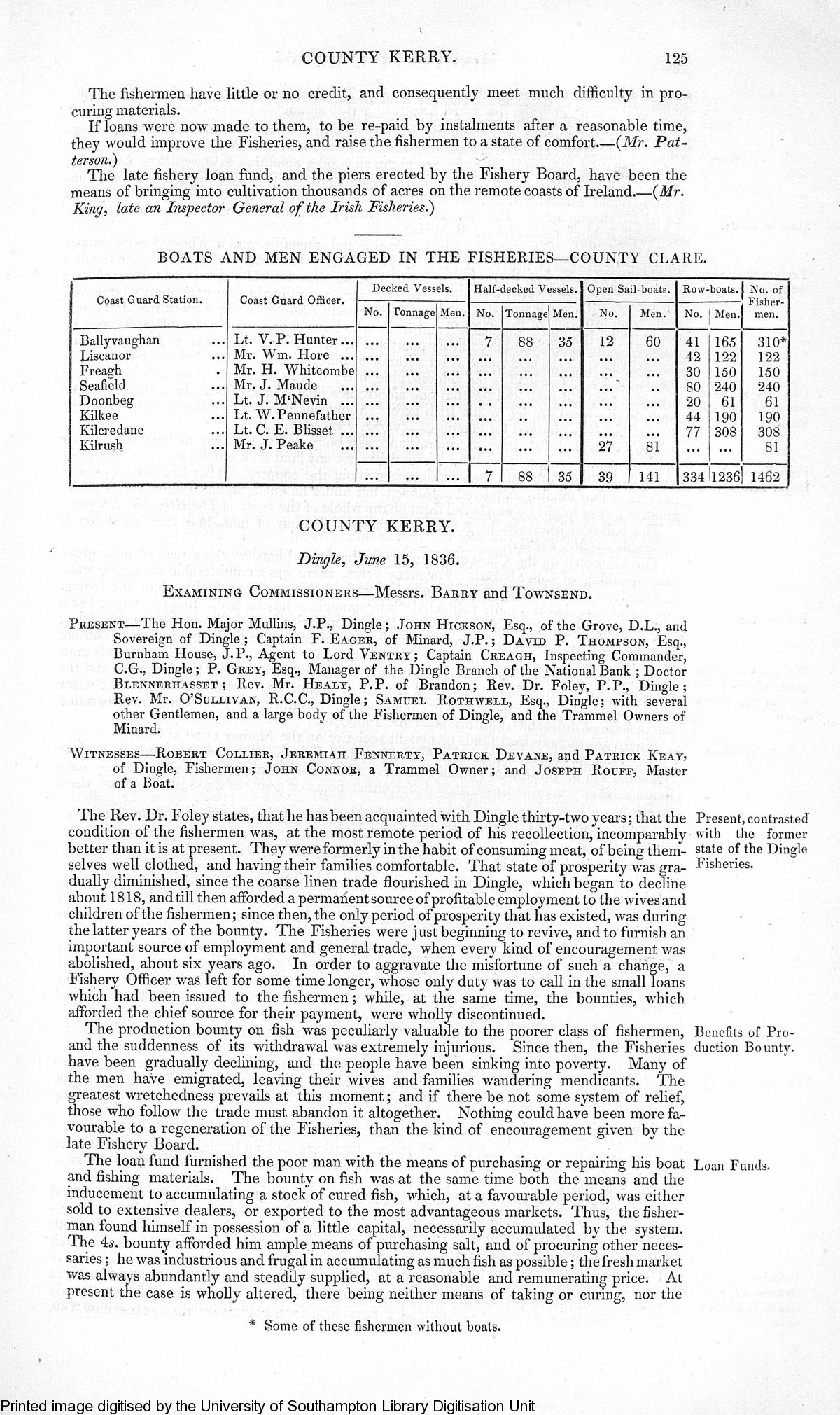.
COUNTY KERRY.
125
The fishermen have little or no credit, and consequently meet much difficulty in pro¬
curing materials.
If loans were now made to them, to be re-paid by instalments after a reasonable time,
they would improve the Fisheries, and raise the fishermen to a state of comfort—{Mr. Pat¬
terson.)
Tlie late fishery loan fund, and the piers erected by the Fishery Board, have been the
means of bringing into cultivation thousands of acres on the remote coasts of Ireland—(Mr.
King, late an Inspector General of the Irish Fisheries.)
BOATS AND MEN ENGAGED IN THE FISHERIES—COUNTY CLARE.
Coast Guard Station.
Coast Guard Officer.
Becked Vessels.
Half-decked Vessels.
Open Sail-boats.
Row-boats.
No. of
Fisher¬
men.
No.
Tonnage
Men.
No.
Tonnage
Men.
No.
Men.
No. 1 Men.
Bally vaughan
Liscanor
Freagh
Seafield
Doonbeg
Kilkee
Kilcredane
Kilrush
Lt. V. P. Hunter...
Mr. Wm. Hore ...
Mr. H. Whitcombe
Mr. J. Maude
Lt. J. M'Nevin ...
Lt. W. Pennefather
Lt. C. E. Blisset ...
Mr. J. Peake
...
...
...
7
88
35
12
27
60
81
41
42
30
80
20
44
77
165
122
150
240
61
190
308
310*
122
150
240
61
190
308
81
...
...
...
7
88
35
39
141
33412361 1462
Present, contrasted
with the former
state of the Dingle
Fisheries.
COUNTY KERRY.
Dingle, June 15, 1836.
Examining Commissioners—Messrs. Barry and Townsend.
Present—The Hon. Major Mullins, J.P., Dingle; John Hickson, Esq., of the Grove, D.L., and
Sovereign of Dingle; Captain F. Eager, of Minard, J.P.; David P. Thompson, Esq.,
Burnham House, J. P., Agent to Lord Ventrt; Captain Creagh, Inspecting Commander,
C.G., Dingle ; P. Grey, Esq., Manager of the Dingle Branch of the National Bank ; Doctor
Blennerhasset ; Rev. Mr. Healy, P. P. of Brandon; Rev. Dr. Foley, P. P., Dingle;
Rev. Mr. O'Sullivan, R.C.C., Dingle; Samuel Rothwell, Esq., Dingle; with several
other Gentlemen, and a large body of the Fishermen of Dingle, and the Trammel Owners of
Minard.
Witnesses—Robert Collier, Jeremiah Fennerty, Patrick Devane, and Patrick Keay;
of Dingle, Fishermen; John Connor, a Trammel Owner; and Joseph Rouff, Master
of a Hoat.
The Rev. Dr. Foley states, that he has been acquainted with Dingle thirty-two years; that the
condition of the fishermen was, at the most remote period of his recollection, incomparably
better than it is at present. They were formerly in the habit of consuming meat, of being them¬
selves well clothed, and having their families comfortable. That state of prosperity was gra¬
dually diminished, since the coarse linen trade flourished in Dingle, which began to decline
about 1818, and till then afforded a permanent source of profitable employment to the wives and
children of the fishermen; since then, the only period of prosperity that has existed, was during
the latter years of the bounty. Tlie Fisheries were just beginning to revive, and to furnish an
important source of employment and general trade, when every kind of encouragement was
abolished, about six years ago. In order to aggravate the misfortune of such a change, a
Fishery Officer was left for some time longer, whose only duty was to call in the small loans
which had been issued to the fishermen; while, at the same time, the bounties, which
afforded the chief source for their payment, were wholly discontinued.
The production bounty on fish was peculiarly valuable to the poorer class of fishermen,
and the suddenness of its withdrawal was extremely injurious. Since then, the Fisheries
have been gradually declining, and the people have been sinking into poverty. Many of
the men have emigrated, leaving their wives and families wandering mendicants. The
greatest wretchedness prevails at this moment; and if there be not some system of relief,
those who follow the trade must abandon it altogether. Nothing could have been more fa¬
vourable to a regeneration of the Fisheries, than the kind of encouragement given by the
late Fishery Board.
The loan fund furnished the poor man with the means of purchasing or repairing his boat Loan Funds,
and fishing materials. The bounty on fish was at the same time both the means and the
inducement to accumulating a stock of cured fish, which, at a favourable period, was either
sold to extensive dealers, or exported to the most advantageous markets. Thus, the fisher¬
man found himself in possession of a little capital, necessarily accumulated by the system.
The 4s. bounty afforded him ample means of purchasing salt, and of procuring other neces¬
saries ; he was industrious and frugal in accumulating as much fish as possible; the fresh market
was always abundantly and steadily supplied, at a reasonable and remunerating price. At
present the case is wholly altered, there being neither means of taking or curing, nor the
Benefits of Pro¬
duction Bounty.
Some of these fishermen -without boats

